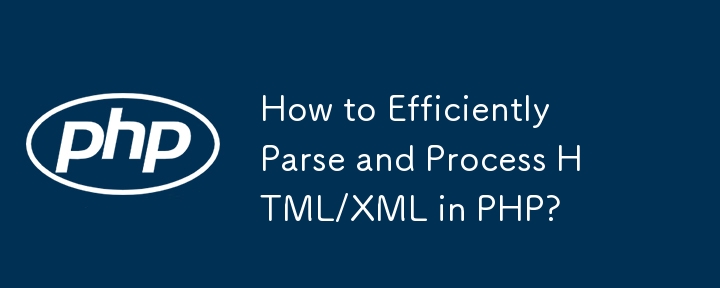Home >Backend Development >PHP Tutorial >How to Efficiently Parse and Process HTML/XML in PHP?
How to Efficiently Parse and Process HTML/XML in PHP?
- Patricia ArquetteOriginal
- 2024-12-27 16:22:11322browse

How do you parse and process HTML/XML in PHP?
Introduction
Parsing HTML or XML in PHP involves extracting information from these structured documents for processing and use in various applications. PHP provides several methods to accomplish this, ranging from native extensions to third-party libraries and even regular expressions.
Native XML Extensions
DOM:
- Provides a DOM API for manipulating XML documents.
- Capable of parsing and modifying real-world HTML, including broken HTML.
- Performs XPath queries and is based on libxml.
XMLReader:
- Pull parser that reads XML documents one node at a time.
- Highly efficient for processing large XML documents.
- Based on libxml.
XML Parser:
- Push parser used to create XML parsers and define handlers for events.
- Flexible configuration and customization options.
- Also based on libxml.
SimpleXml:
- Simplified toolkit for converting XML to objects for easy processing.
- Only suitable for valid XHTML, prone to errors with broken HTML.
Third-Party Libraries (libxml based)
FluentDOM:
- Fluent XML interface, similar to jQuery for the DOM.
- Supports CSS and XPath selectors, extending the DOM with added features.
HtmlPageDom:
- Extension of Symfony2's DomCrawler, tailored for HTML manipulation.
- Adds methods for modifying HTML DOM trees.
phpQuery:
- jQuery-like CSS selector-driven DOM API.
- Chainable and supports command-line interface.
laminas-dom:
- Laminas component for working with DOM documents.
- Offers a unified interface for XPath and CSS selectors.
fDOMDocument:
- Extends the DOM to use exceptions for error handling.
- Adds custom methods and shortcuts for convenient DOM manipulation.
sabre/xml:
- Library that wraps XMLReader and XMLWriter classes.
- Creates a "xml to object/array" mapping system with efficient single-pass reading and writing.
FluidXML:
- Fluent API for manipulating XML.
- Leverages XPath and fluent programming to simplify operations.
Third-Party (not libxml-based)
PHP Simple HTML DOM Parser:
- DOM parser for HTML, supports invalid HTML.
- Relatively slow and memory-intensive compared to libxml-based libraries.
PHP Html Parser:
- Allows CSS selector-based tag selection, similar to jQuery.
- Performance and resource usage may limit its effectiveness.
HTML 5
HTML5DomDocument:
- Extends the native DOMDocument, preserving HTML entities and void tags.
- Supports CSS selectors and element-specific methods.
HTML5:
- Standards-compliant HTML5 parser and writer written in PHP.
- Provides serialization, PHP namespaces, composer support, and more.
Regular Expressions
Warning:
Using regular expressions to parse HTML is generally discouraged due to their brittleness. The syntactical rules involved in HTML make robust parsing difficult. Consider using other methods.
Books
- "PHP Architect's Guide to Web Scraping with PHP" (recommended for more comprehensive knowledge)
Conclusion
Depending on your parsing requirements and performance considerations, choose from the various methods described above. Native XML extensions provide efficient and flexible solutions for complex parsing needs. Third-party libraries offer additional features and ease of use. Regular expressions may be suitable for specific, limited scenarios. Consider using dedicated HTML5 parsers for HTML5 markup handling.
The above is the detailed content of How to Efficiently Parse and Process HTML/XML in PHP?. For more information, please follow other related articles on the PHP Chinese website!

